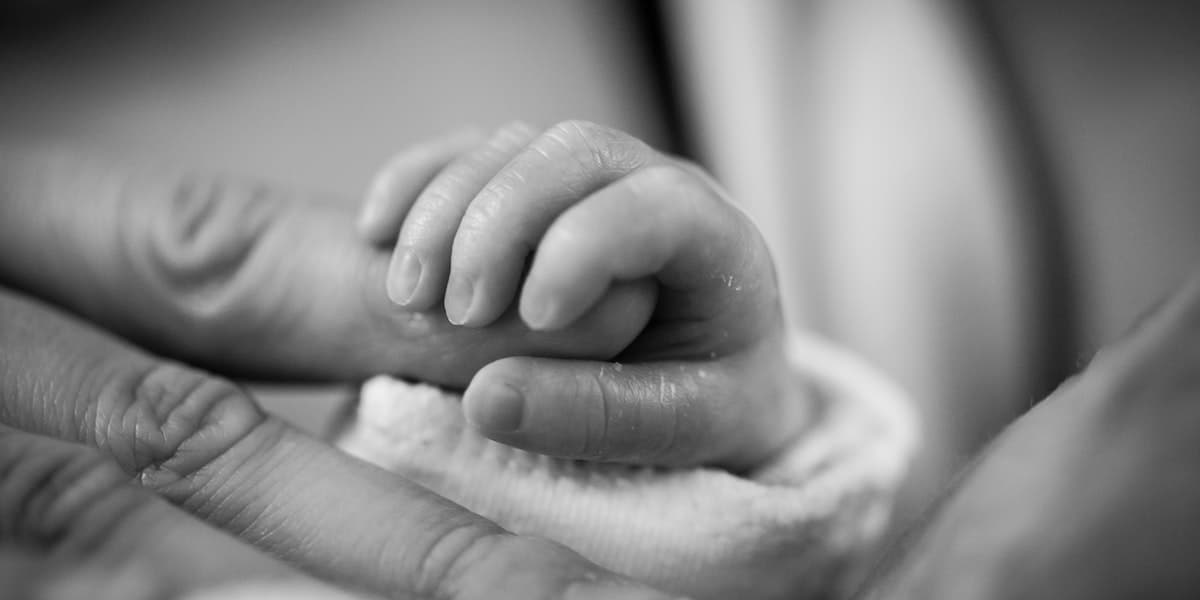All babies will go through a fussy period and most of the time this is nothing to be concerned about. You may be surprised that one minute your baby is smiling and looking content and then they begin to fuss for an unknown reason.
The good news is that there is usually an easily fixable reason why your baby is fussy and things that you can do to ease their distress.
The most common period when babies appear fussier than normal is between 0-4 months when they are adapting to new surroundings, feeding and digesting milk and quickly reaching new milestones.
Your baby will still have times when they are fussy after 4 months but it may be less frequent.
As an Amazon Associate I earn from qualifying purchases. The links below may be affiliate links. Please read my disclosure policy for more information.
Signs that your baby is being fussy
Knowing what is normal and what is fussy behavior from your baby will be different for every parent. As your relationship with your baby grows you will come to understand the reasons why your baby may not be their usual happy self. However, the most common signs of fussiness in babies are:
- Feeling hot or cold
- Struggling to feed
- Feeling more hungry than usual
- Prolonged periods of crying
- Kicking legs a lot
- Stretching out body and stiffening back
- Less smiling and eye contact
- Vomiting
- Runny or hard stools
- More frequent wetting
This list is not exhaustive as only you and other carers for your baby will know when something is out of sync. It is important to know that all babies are different so what helped ease fussiness in your first baby may not necessarily work for future babies.
Is your baby shaking their head? Should you be worried?

How to know what is normal and what is a problem?
All of the above signs of fussiness can be normal for your baby and you may know exactly how to handle the symptoms. Generally, you will begin to notice patterns and times when your baby is fussy, for example after a feed or when they haven’t filled a diaper for a while.
Nighttime is a common time for babies to fuss if their needs have not been met and they are unable to sleep easily. When these normal levels of fussiness occur, babies can be soothed by feeding, burping, changing a diaper, swaddling or rocking, for example.
When there is no pattern to fussiness and things feel different, you will need to investigate the problem.
10 common reasons babies are fussy
If you are unsure as to what is causing fussiness there are 10 common reasons why.
1. Tiredness
If your baby is crying a lot and it is the same cry that you usually associate with them feeling sleepy then it could be that they are still tired.
Even if your baby has just woken from a nap, they may be feeling tired but are struggling to drift back off. It takes around 6 weeks for the sleep hormone melatonin to kick in so your baby may struggle to sleep easily before this time.
That is not to say that babies will sleep perfectly after 6 weeks old, just that it does start to become easier for them.
Younger babies are only fully alert for around 60-90 minutes at a time so it is good practice to allow them to sleep, even for a short period, after every 90 minutes in the early days.
You may also find that as your baby starts to grow that you will need to change your routine slightly to meet their sleep needs. This could mean bringing bedtime forward by half an hour or introducing a bedtime routine to help your baby begin the sleep process.
Newborn sticking tongue out, what does it mean?
2. Hunger
The second most common reason babies become fussy is because they are hungry.
Some parents stick to a strict regime of feeding times and nap times but these should not remain rigid if your baby is showing signs of being hungry.
As your baby grows they may need to feed more often and for longer. This is especially the case for breastfed babies who may, at times, need feeding every 1-1.30 hours during the first 6 months of life.
It may seem like your baby is taking in a lot of milk during their feed but they may actually only be taking a small amount to fill their small stomach. As their stomachs are small they digest milk quickly and therefore become hungry more often than adults.

3. Digestion problems
As your baby grows and begins to take on more milk, they can become prone to stomach problems, such as gas. Their organs are quickly growing and becoming accustomed to new bacteria from germs we find in everyday life so, like us, they will get a stomach upset from time to time.
If your baby suffers from gas and reflux there are over the counter remedies that can help or you can try to burp more regularly and effectively.
Burping your baby before and after a feed is good practice to reduce gas and feeding the baby with their head propped up as much as possible can reduce reflux symptoms. If you are in doubt about reflux or excess gas you should speak to a medical professional.
4. Colic
If your baby is crying for at least three hours every day for no particular reason they may be diagnosed as having colic.
Colic usually starts at around 6 weeks and can last up to 12 weeks, or longer for some. Studies have struggled to find a cause of colic and it seems that some babies do cry for no reason, so it is normal.
For support and advice on colic speak to your doctor.
Best bottles if your baby has reflux
5. Pain
If you don’t think that your baby is suffering from colic but there do appear to be in pain you should check them over for any visible signs, such as scratches or red marks on their skin. If you have checked the usual signs of wet diapers, gas, and discomfort then it may be that your baby is in pain. In this case, you should speak to a doctor for advice, particularly if your baby is running a fever.

6. Teething
One of the most common causes of pain in babies is teething pain. Pain can start a long time before you actually see a tooth appear and usually coincides with red or swollen gums, chewing on their hands or a pacifier, drooling excessively and crying.
Symptoms can get worse a night time when your baby is trying to rest and sleep.
You can buy teething gels and powders that can help reduce the pain for the baby and, of course, there are lots of teething gadgets and cooling toys that can help relieve some of the stress that teething brings for your baby.
7. Dirty diaper
This should be an obvious one and you will generally know when your baby’s diaper needs changing but sometimes they can fill a diaper right after you have changed them.
If your baby shows a strong dislike to any sign of wetness in their diaper you may need to change more often. Some babies can tolerate a small amount of urine in their diaper and others become fussy at even the slightest drop.
Make your baby wipes, cheap and easy ideas
8. Over stimulation or under stimulation
It can be hard to find a balance between keeping your baby happy and not stimulating them too much. Try to engage with your baby by chatting and playing with them but if they are showing signs of being fussy or you know that they have been awake for a while then try not to force play too much.
This is something to think about if you have a large family and the bay is being stimulated and passed around among too many people at once. Try slowing things down a little but be careful that baby becomes too bored of a lack of interaction.

9. Discomfort
Your baby may look very comfortable but do check that the clothes that they are wearing are not too restrictive or they are not swaddled too tightly.
You should check that labels on clothes are soft and that all zips, buttons or ties are closed fully so as not to dig into the baby. You should check all layers of clothing including vests and diapers.
How to burp a baby that’s hard to burp
10. Milestones
Signs that your baby is being fussy may just be that there is no core problem at all, there are simply adjusting to meeting new milestones, such as rolling over, lifting their head, preparing for weaning etc.
All of these milestones are big deals for babies and they are simply fussing as they are adjusting to something new. If you feel that your baby is struggling to meet any of the required milestones you can seek support from your family practitioners.
Be careful not to worry too much, though, as some babies take longer than others to meet significant milestones.
Other reasons your baby may be fussy could include: needing their pacifier more frequently, separation anxiety or adapting to childcare.
With time and patience, you will soon come to understand each cry your baby makes so that you can help them become less fussy and support their needs.





